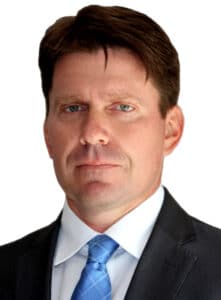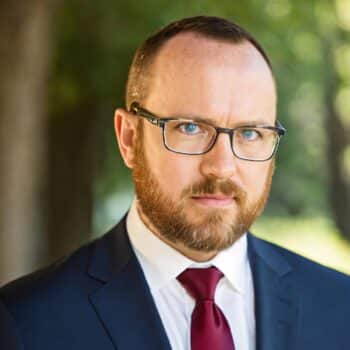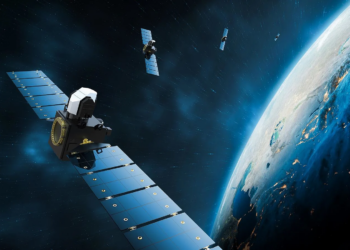The recent increase in satellite connectivity investment reflects the commitment of industry leaders who have turned challenges into opportunities.
In the wake of the pandemic, the satellite sector faced a 58% year-over-year drop from $47.4 billion in private equity investment in 2021 to $20 billion in private equity investment in 2022. And the sector saw only modest improvement in 2023, tracking $29.1 billion in large transactions.
However, by September of this year, the Connectivity Business News Transactions Database tracked $54.5 billion in large investment and M&A transactions among space, satellite and terrestrial connectivity companies.
CBN presents 11 executives who have overseen significant company milestones in a competitive satellite and telecom industry. The expertise they bring to their organizations propels their companies to capitalize on a rapidly changing industry. These execs are committed to success and innovation in the connectivity sector and are inspiring investors to back a variety of business models in a young industry radiating potential.
Leighton Carroll, CEO, Baylin

Leighton Carroll, of Toronto communications tech provider Baylin Technologies (TSX: BYL) since 2021, has steered the company out of a post-pandemic rut toward becoming a prosperous leader in connectivity upgrade projects across the globe through its terrestrial antenna and satcom subsidiaries.
While Baylin in 2023 felt the impact of macroeconomic conditions such as high interest rates and materials shortages, Carroll told CBN that he expects Baylin’s strides toward global expansion, particularly in Europe, to pay off in the coming years.
In each quarter of 2024, the company has reported annual revenue growth, bolstered by connectivity upgrade projects through its antenna-focused subsidiary Galtronics.
Galtronics is tackling projects for various large venues this year, including:
- The University of Alabama’s Bryant-Denny Stadium;
- Allegiant Stadium in Las Vegas;
- New York City; and
- Large airports such as Salt Lake City International Airport and London Heathrow Airport.
Each project involves the installation of Galtronics’ panel and multibeam antennas, Carroll previously told CBN.
Baylin’s satcom subsidiary Advantech Wireless has also nabbed significant contracts this year, including for NASA’s Artemis program and undisclosed NATO applications.
Before joining Baylin, Carroll served as CEO of telecommunications providers Squan Holdings and Maritime Wireless Services and held leadership roles at wireless carrier AT&T.
Joshua Cryer, president and CEO, Reticulate Micro
Joshua Cryer, of space tech startup Reticulate Micro, is making waves in the satcom market, particularly in the national security sector, where demand for innovative, secure connectivity technologies is surging.

Under Cryer’s leadership, the startup is experiencing rapid growth toward a $30.8 million market cap.
The Palm Bay, Fla.-based company, founded in 2022, develops secure communications technologies, including the Vast video encoding system.
A veteran with more than 25 years in military communications, Cryer developed communications technologies for the U.S. Navy and led NATO’s Satellite Communications technical team before joining Reticulate Micro in January.
Reticulate Micro this week announced the successful demonstration of what it believes to be the first real-time video streaming over the U.S. Special Operations’ Mobile User Objective System tactical satellite network. This is the latest win in a prolific year of driving improvement in military connectivity.
The value of Reticulate Micro’s government work has not been disclosed. However, Reticulate Micro has conducted numerous government demonstrations of its VAST encoding technology since the start of the year.
The company this quarter also announced the shipment of its first VAST encoders and its first enterprise VAST customer, global well-being seminar provider Access Consciousness.
The company raised $5.8 million across two fundraising rounds in 2023 following Cryer’s appointment as CEO, according to the online financial database Crunchbase.
Under Cryer’s leadership, the company:
- Was a founding member of the Waveform Architecture for Virtualized Ecosystems consortium, an industry group aimed at accelerating innovative network solutions; and
- Was named the exclusive supplier for defense tech company Himera’s tactical radios in the United States.
Daniel Faber, CEO, Orbit Fab
Daniel Faber, of Colorado-based satellite refueling startup Orbit Fab, aims to build a circular economy in space, which he defines as a self-sustaining, space-based economy that enables the space market to reach its $1 trillion potential by the end of the decade.

Faber told CBN that without a sufficient refueling method in space, satellite operators are at risk of losing hundreds of billions of dollars in assets alone, not including lost revenues from shortened satellite life spans.
To help propel a sustainable space economy, Orbit Fab is working with the U.S. Space Force to deliver fuel to national security satellites starting in 2025, with the goal of refueling every Space Force satellite by 2028. The value of the contract was not disclosed, but the Space Force in April said it was interested in allocating $20 million per year toward satellite refueling services.
Orbit Fab in July completed a successful test of its Grapple, Reposition and Interface Payload, the startup’s refueling nozzle that transfers fuel by docking with satellites equipped with Orbit Fab’s RAFTI (Rapidly Attachable Fluid Transfer Interface) refueling port.
The company shared with CBN in March that each RAFTI costs just $30,000 and lasts for the 15-year average life span of a multibillion-dollar geostationary satellite. This enables operators to optimize their satellite’s revenues. Orbit Fab has plans to ship 100 RAFTI refueling ports by yearend.
Faber has more than 20 years’ experience in the space and connectivity sectors, previously serving as CEO of Deep Space Industries and Space Arena before co-founding Orbit Fab in 2018. He is also an adviser at early startup investor Space Ventures.
Tina Ghataore, CEO, Aerospacelab North America
Tina Ghataore, chief strategy revenue officer at Belgian satellite manufacturer Aerospacelab and CEO of the company’s North American branch, joined Aerospacelab just over a year ago. She is leading the company’s charge toward building next-generation, mission-specific satellites and components that accommodate rising demand for accurate, reliable space-based data.
Ghataore served as chief commercial officer at laser communications developer Mynaric (NASDAQ: MYNA) from 2020 to 2023 and held leadership roles at Abu Dhabi-based satcom provider Yahsat, consulting firm The Ekkam Group, in-flight entertainment tech supplier Panasonic Aviation Corp. and Boeing.

On Sept. 5, Aerospacelab, which was founded in 2018, announced that it opened its first U.S.-based facility in Torrance, Calif., with the intention of manufacturing two satellites per week to compete for SDA contracts and accommodate surging market demand for smallsats, particularly with the integration of AI and machine learning.
Aerospacelab builds mission-specific satellites that range from communications to debris-tracking for customers that include Canadian space company MDA Space, German aerospace firm Vyoma, ESA and European defense agencies.
The space startup has raised $68 million to date, according to financial database Traxcn.
Stella Guillen, CCO, Isar Aerospace
Stella Guillen, of launch startup Isar Aerospace, has overseen multiple landmarks for the young launch firm. Since joining Ottobrun, Germany-based Isar in 2021, she has helped the company contribute to clearing Europe’s launch bottleneck.

Isar this year raised $90 million, including $70 million in a June series C extension, bringing the funds raised to $445.7 million since the company’s 2018 founding.
Isar has agreed to be the first launcher to use Norway’s Andoya Spaceport, which aims to be the first Europe-based spaceport to host orbital missions next year.
In February 2023, Isar inked a deal with Seattle-based launcher Spaceflight for one dedicated launch in 2026 from Norway using Isar’s Spectrum reusable two-stage launch vehicle following Isar’s planned 2025 inaugural launch.
Guillen was vice president of sales and marketing at French launcher Arianespace and vice president of business development at Firefly Aerospace subsidiary Spaceflight Industries. She also was director of business development at SpaceX for six years.
Tarun Gupta, co-founder and CPO, Skylo
Tarun Gupta, of Mountain View, Calif.-based non-terrestrial network service operator Skylo Technologies, has helped lead the company’s charge toward standardizing satellite IoT through strategic partnerships.

Skylo lists 24 devices certified under its network, which is powered by satellite operator partners including Viasat and EchoStar.
In January, the company launched a standardized direct-to-smartphone SMS service and, in February, it closed a $37 million series C fundraising round led by Intel Capital and Seraphim Space.
Gupta told CBN in May that, rather than go public via a special purpose acquisition company, or SPAC, Skylo opted to remain private and focus on strategic partnerships.
Before co-founding Skylo in 2017, Gupta held several roles at tech conglomerate Google, including head of strategy and operations for Google Assistant.
Google’s recently released Pixel 9 phone includes a satellite SOS service powered by Skylo’s non-terrestrial network.
Takeshi Hakamada, founder and CEO, ispace
Takeshi Hakamada, of Japanese lunar mission tech company ispace, has led the company through a year of milestones.

This month, ispace announced creation of a lunar advisory board aimed at accelerating development of the global space economy. The company also announced plans to launch its Mission 2, which features its Resilience lunar lander and Tenacious micro rover, as early as December.
Hakamada has international plans for ispace.
The tech firm in March raised $53.4 million in a stock sale, accompanied by a $55 million NASA contract for Mission 2.
The March funding was followed by $45 million in financing from investment bank Sumitomo Mitsui Banking for Mission 3, in which ispace’s U.S.-based subsidiary, ispace Technologies, will launch two relay satellites into cislunar orbit via SpaceX in 2026.
The subsidiary on Sept. 25 announced the opening of its Summit Mission Control Center out of its Denver, Colo., headquarters to support its U.S. lunar missions.
Since Hakamada founded ispace in September 2010, the company has raised $464 million in funding, a company spokesperson told CBN.
Maureen Haverty, investment principal, Seraphim Space
Maureen Haverty, of London-based space tech investment firm Seraphim Space, is a leader in Seraphim Space’s space accelerator program, which has raised more than $320 million for seed and pre-seed startups and prepares them for investors.

But for Haverty, helping startups thrive in the competitive investment landscape is about more than raising money, prompting Seraphim to take a different approach with its accelerator program.
In a June investment webinar presented by CBN, Haverty elaborated on the importance of startups using a tool such as a space accelerator to make informed choices when seeking early financing, especially regarding rising geopolitical tensions that startups and investors alike should be wary of during a space company’s early stages.
Haverty joined Seraphim in 2022 after serving as chief operating officer at aerospace company Apollo Fusion and later as senior director at launch provider Astra Space.
Haverty’s portfolio includes NewSpace startups Voyager Space and Atmos Space Cargo.
She is also a board observer for Atmos, space logistics company D-Orbit and satellite data company Edgybees.
Katanya Kuntz, co-founder and CEO, Qubo Consulting

Katanya Kuntz co-founded quantum tech consulting firm Qubo Consulting in 2023 with A.J. Sikora to prepare large organizations, investors and startups for quantum networks.
Qubo’s largest partners and clients include:
- Canadian nonprofit tech industry organization Mitacs; and
- The City of Calgary.
Qubo and Mitacs on Sept. 23 announced they are teaming up to deliver quantum training to Canadian students in an effort that launches next month.
Qubo is a member of Quantum Industry Canada, Canada’s national consortium dedicated to advancing the country’s quantum technology sector.
Kuntz advises investors and connectivity startups on getting ahead of the quantum movement, with a belief that quantum networks are a disruptive, inevitable technology in the satcom world. She works with:
- Institute for Quantum Computing at the University of Waterloo in Waterloo, Ontario, where she is a research associate;
- The Canadian Space Agency, where she is a science team coordinator for the QEYSSat mission, Canada’s first demonstration of quantum key distribution between a satellite and a ground station planned for 2025; and
- The Institute of Electrical and Electronics Engineers (IEEE), where she is a featured author. The organization is the world’s largest technical professional organization dedicated to the global advancement of technologies, according to the IEEE website.
“If you want to have a continuous network always working, you’re going to need a mesh network of quantum-enabled satellites,” Kuntz previously told CBN, speaking on the future of connectivity.
Chiara Manfletti, CEO, Neuraspace
Chiara Manfletti, CEO at space traffic management provider Neuraspace, is using her research background to expand awareness of dangers in the increasingly crowded space environment.

Manfletti’s goal at Neuraspace, which was founded in 2020, is to make actionable insights on space traffic available to satellite operators to help them mitigate the risks of in-orbit collisions, she recently told CBN.
Neuraspace on Sept. 11 announced a collaboration with the Portuguese Air Force in which the partners will install Neuraspace’s new, AI-enabled optical telescope at Air Base No. 11 in Beja, Portugal, to deliver space surveillance and tracking data to satellite operators.
In March, Neuraspace launched a free version of the platform to encourage more satellite operators to be proactive in preventing collisions and the resulting orbital debris.
The company in August announced a partnership with the international organization EISCAT Scientific Association, enabling Neuraspace to use EISCAT’s advanced radar, and ionospheric and atmospheric data to improve its solutions.
Neuraspace’s customers include:
- Vienna, Va.-based satellite operator Spire Global (NYSE: SPIR);
- Cape Canaveral, Fla.-based aerospace firm Sidus Space (NASDAQ: SIDU);
- South African satellite manufacturer Dragonfly Aerospace; and
- Lithuanian satellite manufacturer NanoAvionics.
Before joining Coimbra, Portugal-based Neuraspace in November 2021, Manfletti was a senior adviser for ESA.
In 2019, she was named the first president of the Portuguese Space Agency. She also is a professor of space propulsion at the Technical University of Munich.
Scott Wisniewski, president and CSO, AST SpaceMobile
Scott Wisniewski, of satellite-to-cell connectivity provider AST SpaceMobile (NASDAQ: ASTS), was promoted to president of the company in June in addition to his role as chief strategy officer. He has spearheaded critical strategic partnerships that have propelled a surge in company growth ahead of its milestone satellite launch this month.

Founded in May 2017, AST SpaceMobile entered Nasdaq in April 2021, one month before Wisniewski joined the leadership team.
Previously, Wisniewski was managing director at New York-based investment bank Barclays.
Midland, Texas-based AST launched its first five commercial BlueBird satellites on Sept. 12 following two years of supply chain-related delays.
AST’s market cap was just $568.1 million on May 15 when the company reported its first revenues in six consecutive quarters. The company’s market cap has since surged following commercial deals with AT&T and Verizon, which Wisniewski fronted.
As of Sept. 9, AST SpaceMobile has a market capitalization of $7.7 billion.









